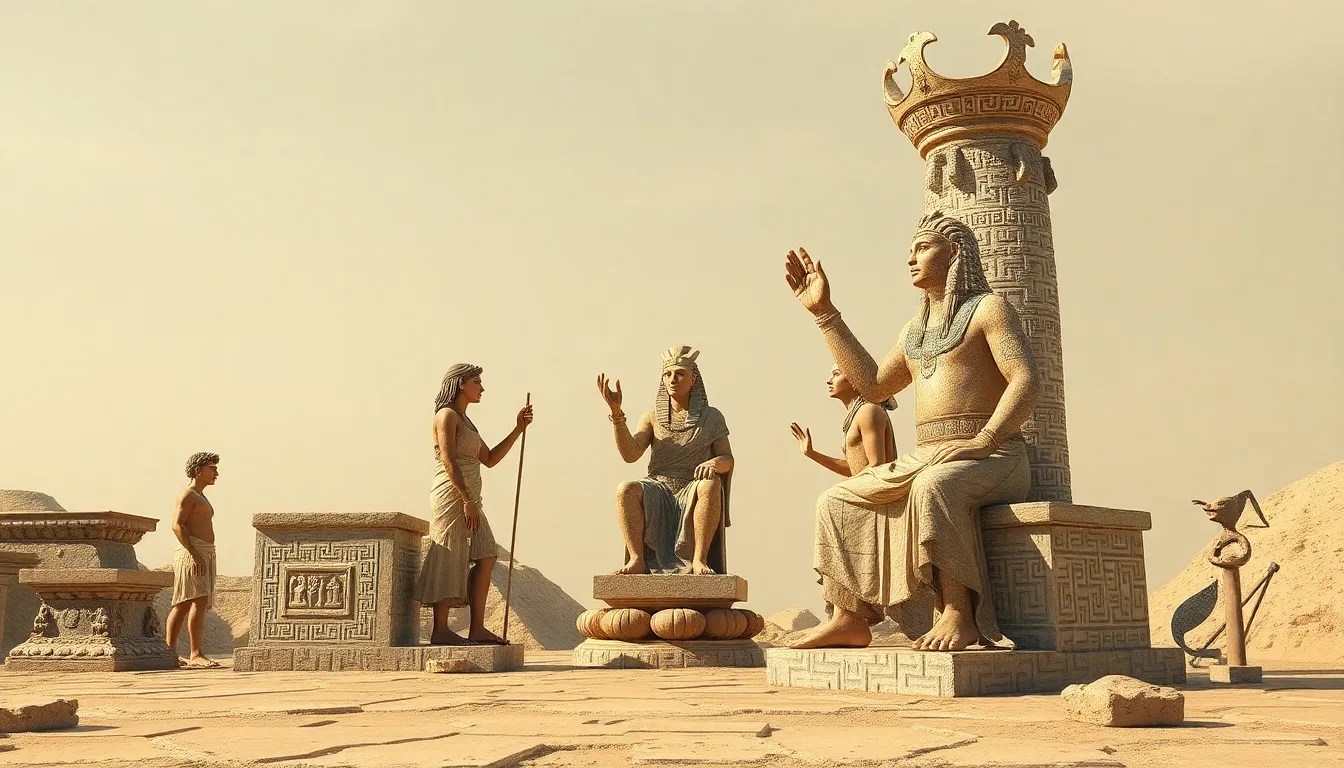The Role of Oracles in Babylonian Economic Practices
I. Introduction
Babylonian society, thriving in ancient Mesopotamia, was marked by complex economic structures and rich cultural traditions. The economy was predominantly agrarian but also included trade, craftsmanship, and the management of resources. In this vibrant society, oracles played a crucial role, serving as intermediaries between the divine and the mundane. This article aims to explore the significance of oracles in Babylonian culture, particularly how they influenced economic practices and decision-making.
II. Understanding Oracles in Babylonian Culture
A. Definition and types of oracles
In Babylonian culture, oracles were individuals or systems through which divine communication was believed to occur. They provided guidance on various matters, including personal, political, and economic decisions. The main types of oracles included:
- Dream interpretation
- Extispicy (the examination of animal entrails)
- Astrological forecasts
- Direct communication with deities through priests
B. Historical context of oracles in Mesopotamia
Oracles have been a part of Mesopotamian culture since its early days. They were integral to the governance and social structure of city-states, with their practices evolving alongside the complexities of society. The establishment of temples as centers of worship and economic activity further solidified the role of oracles.
C. Key figures and deities associated with oracles
Several deities were particularly associated with oracles, including:
- Enlil: The god of air and authority, often consulted for major decisions.
- Ishtar: The goddess of love and war, whose favor was sought in both personal and economic matters.
- Marduk: The chief deity of Babylon, whose oracles were highly revered.
III. The Mechanisms of Oracle Consultation
A. Rituals and practices for seeking oracle guidance
Consulting an oracle involved elaborate rituals designed to appease the gods and ensure a favorable response. This could include offerings, sacrifices, and specific prayers performed by priests.
B. The role of priests and diviners
Priests acted as intermediaries, interpreting divine messages received through oracles. Their training was extensive, and they were respected figures within society. Diviners specialized in various methods, allowing for a range of insights based on the context of the inquiry.
C. Tools and methods used in oracle consultations
Consultation methods varied, but some of the most notable included:
- Extispicy: The examination of the liver of sacrificial animals to draw conclusions about future events.
- Dream interpretation: Analyzing dreams to uncover divine messages.
- Astrology: Using celestial events to predict earthly occurrences.
IV. Oracles and Economic Decision-Making
A. The influence of oracle predictions on trade and commerce
Oracle predictions significantly influenced trade routes, market activities, and commercial relationships. Merchants often consulted oracles before embarking on trade missions to ensure success.
B. Case studies of specific economic decisions guided by oracles
Several recorded instances highlight how oracles guided economic decisions:
- Consultations before establishing new trade routes.
- Decisions regarding the timing of agricultural planting and harvesting.
C. The role of oracles in agricultural practices and crop planning
Oracles were pivotal in determining agricultural cycles. Farmers relied on oracle guidance to decide the best times for planting and harvesting, which was crucial for ensuring bountiful yields.
V. Oracles and Social Hierarchy
A. How oracles reinforced social structures and power dynamics
The consultation of oracles often reinforced existing social hierarchies. Decisions made based on oracle guidance frequently favored the ruling class, further entrenching their power.
B. The relationship between rulers and oracles
Rulers maintained close relationships with oracles, often consulting them for advice on warfare, governance, and resource allocation. This relationship was mutually beneficial, as rulers sought divine favor while oracles gained prestige and power.
C. The impact of oracle decisions on different social classes
Oracles’ decisions had varying impacts on different social classes. While the elite benefited from favorable predictions, lower classes faced the consequences of economic policies influenced by oracle consultations.
VI. The Intersection of Religion and Economics
A. The spiritual justification of economic practices through oracle guidance
Oracle guidance was often framed as divine will, providing spiritual justification for economic practices. This connection between religion and economics helped legitimize actions taken by rulers and merchants.
B. The role of temples as economic centers influenced by oracles
Temples served not only as religious sites but also as economic hubs. They managed vast resources and were often involved in trade, with oracle guidance influencing their economic activities.
C. The implications of divine favor on economic success
Divine favor, as interpreted through oracles, was seen as essential for economic prosperity. Successful ventures were often attributed to the gods’ approval, reinforcing the importance of oracles in economic planning.
VII. Historical Case Studies
A. Notable instances of oracle-led economic decisions in Babylon
Several notable instances illustrate how oracles influenced economic decisions:
- The use of oracles to determine the timing of harvest festivals.
- Consultations that led to the establishment of trade alliances with neighboring city-states.
B. Comparisons with other Mesopotamian city-states
While Babylon was prominent in oracle usage, other city-states like Ur and Akkad also relied on oracles. However, the scale and influence of Babylonian oracles were particularly significant.
C. The long-term effects of oracle consultation on Babylonian economy
Oracle consultations shaped the economic landscape of Babylon, leading to the development of complex trade networks and agricultural practices that would influence the region for centuries.
VIII. Conclusion
A. Summary of the role of oracles in shaping Babylonian economic practices
Oracles were integral to Babylonian economic practices, influencing decisions in trade, agriculture, and governance. Their guidance was sought to ensure prosperity and divine favor.
B. Reflection on the legacy of oracles in ancient economies
The practices surrounding oracles left a lasting legacy in ancient economies, as they reflected the interplay between spirituality and economic decision-making.
C. Final thoughts on the relevance of these practices in contemporary understanding of economic decision-making
The role of oracles in Babylonian society highlights the importance of cultural beliefs in shaping economic practices. Understanding these historical contexts can provide valuable insights into contemporary economic decision-making processes.



